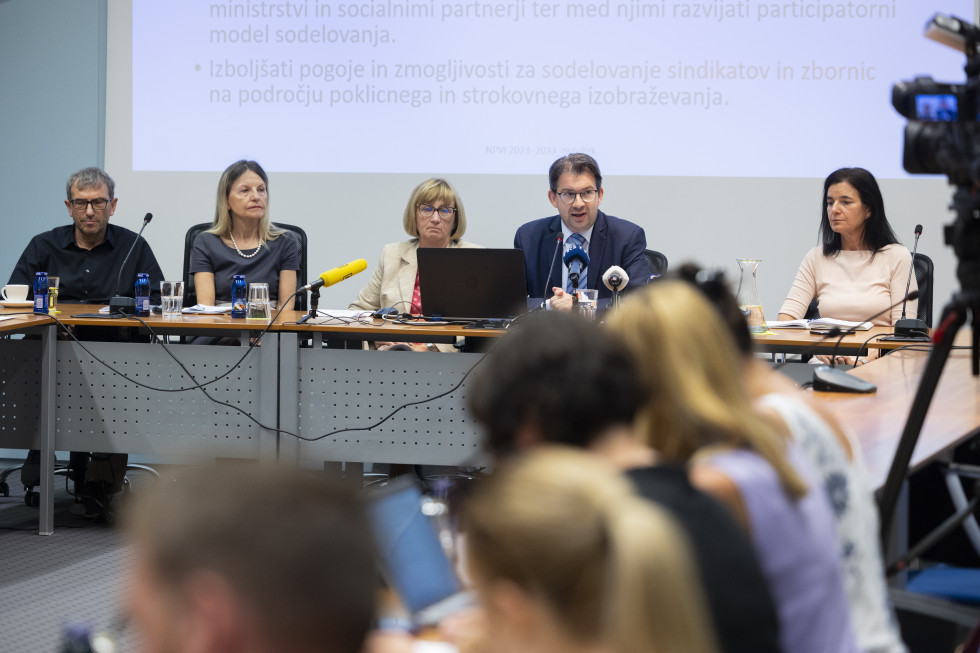Proposal for the National Education Programme for the period 2023–2033 submitted to the Minister
The working group presented a draft proposal for the National Education Programme in early February, which was followed by a public consultation on the proposed solutions with key stakeholders in the field of education. Between 14 March and 11 April 2024, the working group held six regional consultations for education professionals and managers in Škofja Loka, Novo Mesto, Ajdovščina, Pesnica near Maribor, Celje and Ljubljana. In addition to the regional consultations, the working group held consultations with representatives of public institutes in the field of education, expert councils and working groups in the field of education, and employees of the Ministry of Education, and a public consultation on the draft proposal was held in the National Assembly on 15 March 2024.
In total, 486 comments, initiatives and suggestions on the draft National Programme were received, 470 of which were submitted using the online form and 16 by email. The initiatives received were discussed at the meetings of the umbrella working group and subgroups.
Updates mainly in the field of upper secondary education
The final proposed document sets out a total of 21 strategic objectives, 55 strategic sub-objectives and 306 measures. The main changes introduced by the final proposal for the National Education Programme compared to the draft proposal concern, inter alia, upper secondary vocational and technical education, the general and vocational matura examinations, physical activity of pupils, upper secondary students and adults, pre-school education, music education, residence halls for upper secondary students, and the inclusion of immigrants in the education system.
Instead of introducing a compulsory free day programme for pre-school children one year before they start school, it is now envisaged that children not enrolled in kindergarten could enrol in a short kindergarten programme of 240 to 480 hours, spread out from March to the end of the school year. The size of kindergartens is limited to between 10 and 45 units (in the draft proposal, the upper limit was 40 units), and it is envisaged that the level of education of headteachers will be gradually raised to master's level. Upper secondary education is considered a national benchmark, which means that the State should make it possible for everyone to obtain at least an upper secondary education at any point in their lives. The aim is also to evaluate the structure and purpose of upper secondary vocational and technical education programmes, with an emphasis on short upper secondary vocational and technical education.
The purpose of the evaluation was to identify the programmes that still focus on preparing students for a profession and employment and those that would benefit from stronger general education and prevocational objectives. One hour of sports per week is to be added in the last three years of primary school. Necessary conditions are to be provided for each student to have five hours of physical activity per week (within compulsory or elective subjects, the extended primary school programmes, extracurricular activities, or sports days). In addition to an overall increase in stable sources for financing educational institutions from kindergartens to secondary schools, the programme also envisages additional financing for those educational institutions that are found to operate in special conditions (in terms of, for example, distance from economic and cultural centres, the socioeconomic development of the region, or having large number of immigrant children) and thus require additional funds to appropriately respond to the diverse needs of enrolled children.
Minister Felda: We will examine the proposal
On the submission of the proposal for the National Education Programme for the period 2023–2033, Minister Darjo Felda thanked the working group for their work.
"The Ministry will examine the proposal for the National Programme. I believe that together we will find appropriate solutions to the challenge of what kind of educational system we want and need," he said.
The working group was appointed following a public call for candidates in December 2022 by the then minister responsible for education, Igor Papič. In total, 83 education experts participated in the working group and subgroups. The umbrella working group held 27 sessions, the subgroups held 138 sessions and subgroup chairs held 27 coordination sessions. In addition to the aforementioned regional meetings and public consultations with various stakeholders in education after the publication of the draft proposal for the National Programme, the working group had also organised seven previous public presentations of opinions. At the invitation of the Committee of the National Assembly on Education, Science and Youth, it also participated in the public presentation of opinions on the future of the Slovenian education system held at the National Assembly. The term of office of the working group and subgroup members expired on 30 June 2024.


